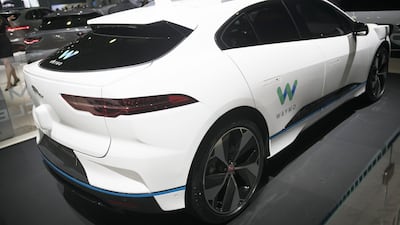As controversy swirls around the death of a Model X driver last month, the head of Alphabet’s self-driving car unit is drawing distinctions between his company’s technology and Tesla Inc.’s Autopilot.
Wei Huang, 38, died March 23 when his sport utility vehicle using the driver-assistance system Autopilot collided with a highway barrier in Mountain View, California, and caught fire. Computer logs recovered from the vehicle showed he didn’t have his hands on the steering wheel for six seconds before the crash, according to a Tesla blog post.
Autopilot isn’t comparable to the fully self-driving technology Waymo has been developing for a decade, said John Krafcik, the chief executive of the former Google driverless car unit. Tesla’s system requires the human driver to remain alert and regularly put a hand on the wheel, while Waymo has been developing technology that requires no human input. Waymo’s tech is already in Chrysler minivans and on the road in pilot testing, with a paid driverless-taxi service coming later this year.
“Tesla has driver-assist technology and that’s very different from our approach,” Mr Krafcik said last week, before Tesla revealed that Autopilot was engaged during the Model X crash. “If there’s an accident in a Tesla, the human in the driver’s seat is ultimately responsible for paying attention. We don’t know what happened here, but there was no self-driving.”
A Tesla spokesman didn’t immediately comment. The National Transportation Safety Board is looking into all aspects of the Model X crash, including reports that the driver had previously raised concerns about Autopilot.
_______________
Read more:
Waymo to put up to 20,000 Jaguar robot cars on streets
Uber driverless cars banned from Arizona roads
_______________
Waymo announced a deal last week to install its self-driving system in 20,000 Jaguar I-Pace electric SUVs that will be deployed as ride-hailing taxis in 2020. Krafcik is actively seeking other partnerships with automakers, including two where he worked as a top engineer and executive: Ford and Hyundai. He said he’s closest to reaching another alliance with Honda to compete in the $164 billion delivery and logistics market.
Autonomous technology aimed at saving lives has come under greater scrutiny following the Tesla crash and the death of a woman who was struck and killed by a self-driving Uber Technologies SUV in Tempe, Arizona, last month. The state’s governor banned Uber from operating autonomous cars there indefinitely. Companies including Toyota also have suspended self-driving tests on public roads.
Waymo, which has logged millions of miles in on-road tests, hasn’t backed off its ambitious plans to deploy its technology commercially by the end of the year. The company has made the case for years to media and lawmakers that its full-autonomy-or-else approach is safer than leaving the driver in the loop like Tesla, which has far more cars on the road collecting data.
CEO Elon Musk has updated Autopilot regularly via software updates and has said Tesla’s electric cars are being built with the hardware necessary for full self-driving capability eventually.
Mr Krafcik said earlier that Waymo’s technology likely would have detected the pedestrian killed in Tempe by Uber’s SUV and avoided the crash, if faced with a similar situation.
“We have a lot of confidence that our technology would be robust and would be able to handle situations like that one,” he told the crowd at the National Automobile Dealers Association convention on March 24, six days after the Uber crash.

